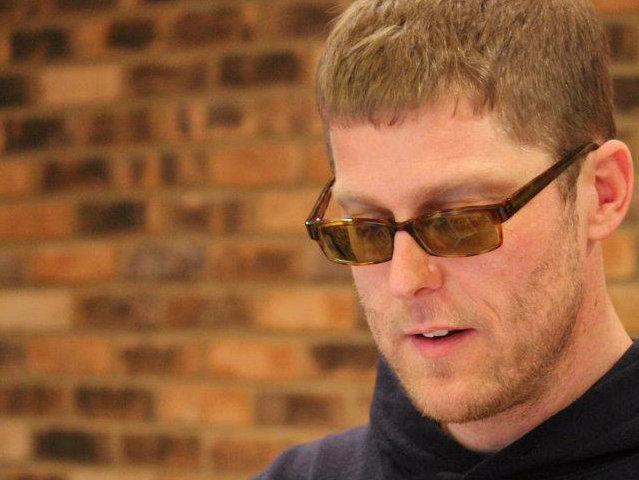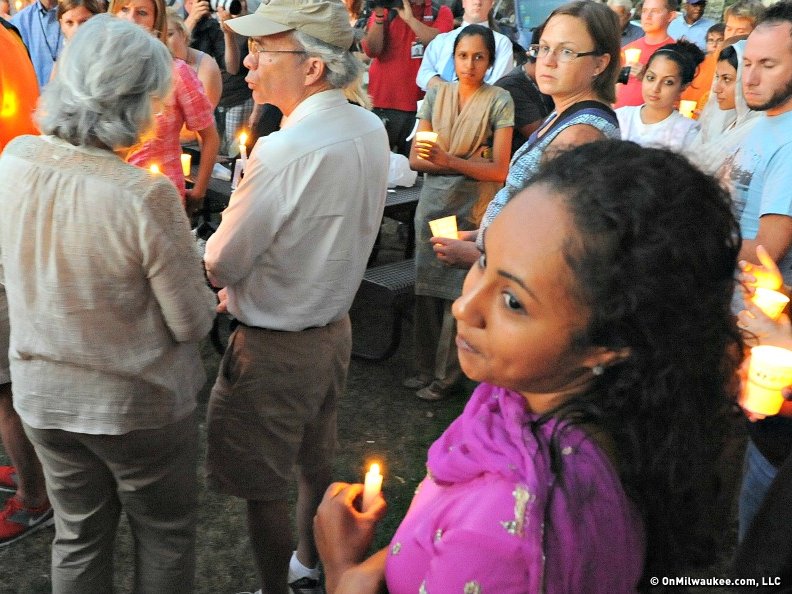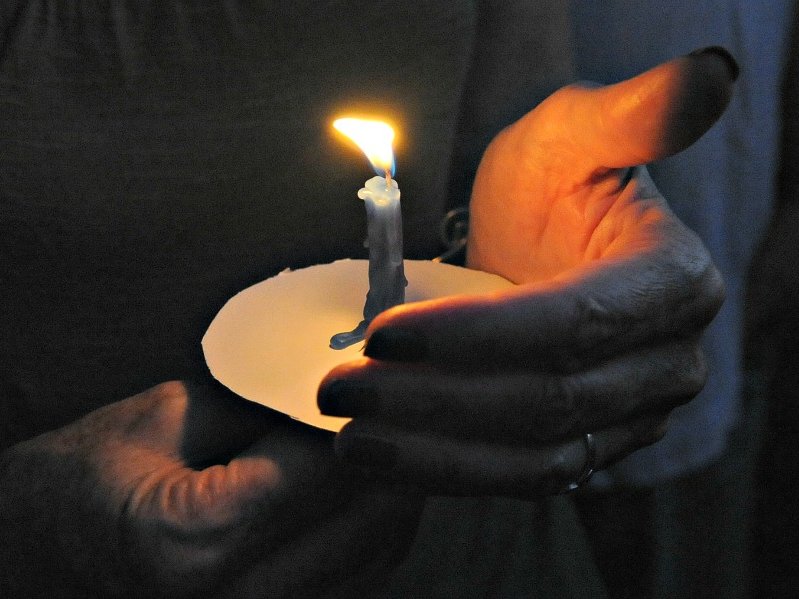Even before Arno Michaelis saw a photo of the man who opened fire at the Sikh Temple in Oak Creek on Sunday, he knew.
"I had a pretty intense feeling that the violence was racially motivated," he says. Then, seeing a photo of Wade Michael Page, he was certain.
"He had a tattoo of a Celtic cross with "14" on his arm, meaning the 14 words, which were, 'We must secure the existence of our race and a future for White Children'," says Michaelis.
It takes one to know one. Or in this case, it took a former one to know one. Michaelis, who was once active in a vicious local racist group based first in Riverwest and later on the near South Side, and was someone you did not want to encounter on the streets, found a way out of the violence. But, he says, he knows that even now, his life could have gone differently.
Instead, Michaelis formed Life After Hate two and a half years ago and has been working tirelessly to promote peace and understanding via an online magazine, talks at schools, books and networking.
On Sunday, within hours of the shooting, Michaelis posted a video statement on his website, LifeAfterHate.org. When I spoke to him on Tuesday, I began by asking him what pushed him to respond so quickly in a public video ...
Arno Michaelis: Because right when that happened, even before the details emerged, I had a pretty intense feeling that the violence was racially motivated, and that being the case, I feel responsibility to respond to it.
The reason why I co-founded Life After Hate, and the reason why I wrote the book, and the reason why I talk to kids, and everything I'm doing now is because I feel an urgency to try and make a positive impact with the world around me to at least counteract, if not, ideally, surpass the harm that I have caused back in my white supremacy days, which lasted from the early '80s until the early '90s.
I started a White Power skinhead crew with some friends in Milwaukee in 1987, and started making my way out in 1994, and I was completely out by 1995. While I was involved in hate groups, I hurt countless innocent people with my bare hands because I was drunk and they had the wrong color skin or they looked to be homosexual, or they were just at the wrong place at the wrong time, and I was looking for someone to hurt.
OMC: So how did you come out of this? What was your epiphany?
AM: It was an ongoing process and it really began as soon as I got involved, in that throughout the time I was a self-proclaimed racist, there were people that I claimed to hate who showed kindness to me, regardless. Even though they knew that I claimed to hate black people; Latino people, there were black and Latino people that I worked with who would still treat me with kindness and respect, and even give me food when I was hungry.
Those things that didn't change me on the spot, but as more and more incidents like that happened, and as time went on, it became more and more difficult for me to maintain this construct of hatred that I was very desperately trying to build.
There were also some milestone events that happened. In 1990, a very close friend of mine – this was a white kid who went to a predominately black school – and he was beat up because he was a minority in his school. He came to us seeking protection, and seeking someone to be his friend, and was off practicing the hatred and violence we had taught him when he was murdered in a street fight. In 1990, that made us all the more hateful and violent and we made him into a martyr and became more hardened and more desperate.
In 1992, I became a father. The skinhead girl I was with, and I willfully conceived a child because we felt it was our duty to do so as white people, and in 1994, she and I split up and I became a single parent. Within another couple of months of that, a friend of mine was murdered in another confrontation on the street, and this time, it occurred to me that if I didn't change my path, death or prison was very likely to take me from my daughter, and we were all each other really had.
I finally gave in to the sense of exhaustion that had been building up, and kind of out of self-preservation at first, started taking steps away.
OMC: When you see something like what happened on Sunday, can you see how people end up in that place?
AM: The environment that leads to this is based on that exhaustion that I was talking about, it's also based on living in a constant living in siege mentality. When you are a white racist, the world around you is constantly sending you information that is contrary to this lie that you're trying to believe, that white people are superior, and different than everyone else.
So, the only recourse is to be in denial about this information from the outside world, which make all sorts of energy. You can't listen to mainstream music, you can't watch TV, you can't watch movies, you can't read anything that's not White Power, you can't associate with anyone who is not a white racist, because doing any of the above will destroy this very fragile card house of racism that you staked your identity on. Now, not only is it a threat to the ideology, therefore it's a threat to that individual's identity.
So, imagine every waking moment, from the time you get up in the morning until the time you go to bed, seeing threats everywhere you look. It's a matter of being in a state of constant intimidation, constant fear, and that will absolutely drive a person crazy. It will drive you to the point where you walk up and murder six people that you never met.
I fortunately never got to that point, but a thought that's been re-occurring to me since this happened is that this very easily could have been me. If it wasn't for my good fortune, and if it wasn't for these acts of kindness that were shown to me, that led to my course changing, I could've been that man.
OMC: Tell us a little bit about the work you're doing now. You said earlier that you hope it helps you atone for what you had done in the past, but what are you hoping it provides to people other than yourself?
AM: Well, the theme of our organization is basic human goodness, the truth that all human beings have the need for compassion and the ability to get it. This truth applies to every single human being on earth. It applies to the shooter on Sunday who is now dead – he had that capacity up until the moment that he died. He just chose not to engage with it.
What we do at Life After Hate is talk about our own stories, about how we came to engage with basic human goodness, and we share that process, that is an ongoing process. I've not reached some pinnacle, and I'm not preaching from the top of some mountain, I'm sharing an ongoing process of character development that began for me really when I left the hate groups of the '90s and is still ongoing today. I still struggle with anger today, and I was incredibly angry in response to this atrocity on Sunday.
I am really taking a lot of inspiration from the Sikh community who have set such an amazing example of forgiveness and love, and I'm very fortunate to be engaged with many people around the world who also set this type of example. What I've been doing today with a huge amount of amazing people who are all contributing to make Life After Hate happen, is sharing that process of character development with the world via online magazine at LifeAfterHate.org. Thanks to our inclusion in the international peace organizations Against Violent Extremism and The Forgiveness Project, we have readers and contributors from all over the world from Sao Paolo, Brazil to Pakistan, to the U.K., to Canada, the United States, and we're getting more contributions, and all of these stories are on that similar theme.
These stories are from former perpetrators of violence who made a positive change to become agents of peace. They're also stories of survivors of violence who despite having undergone absolutely horrific things, have managed to respond with an even greater love and an even greater degree of forgiveness and appreciation for the life that they're leading and for other people to hear these stories, it's a very inspirational process. For people who are struggling and doubting their own ability to make positive changes, it's incredibly empowering to see others who have. To not only follow in their footsteps and gain inspiration from them, but also to gain very practical and applicable tools and techniques to lift yourself up out of whatever struggle you're going through.
In addition to an online magazine, we have an outreach program called "Kindness, Not Weakness," where we do face-to-face presentations and workshops with schools and community groups. I've done about 50 such such talks since Life After Hate was founded in January 2010, the bulk of those have been pro bono. I've had face to face contact with almost 6,000 people, and we're now setting things in motion to increase that outreach, to increase the number of presenters we have and increase the number of people we can reach.
Our outreach work began with an amazing Milwaukee organization called Summer of Peace, which has been working tirelessly to build and practice sorely needed peace in Milwaukee's inner city for the past decade.
Part of that effort to further the reach of our message is a third asset that we have in promoting basic human goodness which is our publishing arm which we call La Prenza, which is Spanish for "The Press." My book, "My Life After Hate" was published by La Prenza, and as of the end of September, we will have e-book editions of 31 back issues of "Life After Hate" available, including articles from authors all over the world dealing with basic human goodness, and we have two books currently in development on the way.
One is called "My Queer Life" by a very brilliant man named Callen Harty, who is gay. He came out in Platteville, Wisconsin in 1979, which was an extremely hostile environment for him at the time, and his book is really a reflection on his life and what he's learned about basic human goodness in the process. The other book we have on deck is called "Jesus is Stupid Fresh" by Jeff Winkowski, who is a lifelong member of the punk rock counter culture and underground, and this book is about how he developed a relationship with Jesus Christ and found inspiration in the teaching of Jesus to practice an unconditional compassion to the world around him.
I think it's really important to get that message across, and it is, as far as our organization is concerned in a spiritual sense, we welcome all expressions of spirituality and we celebrate all expressions of spirituality, so when I hang out with Jeff, and I talk to him about what inspires me spiritually, which is the Dharma – I'm a Buddhist – and he tells me how Jesus inspires him as a Christian, and we inspire each other by sharing our spirituality rather than being intimidated by that and we engage in that process.
We have a lot of amazing Muslim authors who contribute, as well as additional Christian authors, as well as a large amount of very secular authors who are just good human beings and they express their spirituality directly through the human qualities of forgiveness and patience and kindness, so it's really a celebration and a study, and most importantly a practice of what is best about being a human being, and that's what Life After Hate's all about.
OMC: Despite doing all that, do you find that there are still skeptics that feel that people don't fundamentally change – people that believe that you were just too into this to be diametrically opposite? Do you encounter that?
AM: Absolutely. There are plenty of skeptics – surprisingly not as much as I expect. I get hostile responses from people in communities that I used to target, but I can't begrudge anyone. The anger, it's really their option to feel that and express that in whatever way they see fit. It's not for me to judge them. But what I can do is prove them wrong.
My response to anyone who doesn't believe that I've really undergone this change is that I've bared my life for all to see – I'm not lying on Facebook or our website, in the books that I've written or the talks that I've done, and I welcome anyone to scrutinize me to their heart's content, and if they can do so and still come to the conclusion that I'm not genuine, that's kind of on them. I don't have to convince myself of my own sincerity.
A lot response we get is, yeah, well you have changed but some people are horrible people. That guy who shot up the temple on Sunday was just a horrible person, and we need to lock those people up and give up on them, and do I answer that, if they would've given up on me, I could've easily been that guy? The only reason that I was able to make my transformation was because people gave me that chance.
I work with a really amazing man named Sammy Rangel, who is a former Latino gang banger. He grew up in horrible poverty and abuse and he became a very violent person himself. He made some really amazing, positive changes and is now an incredible representative of peace in his community, but he said he tried to change a thousand times, and it was the thousandth time that it worked. If no one had given him that chance, then he couldn't have given him that change. So my answer to people who say that some people are just bad and that's that, is that if you've given up on this person, then you're not creating an environment conducive to any other result.
Born in Brooklyn, N.Y., where he lived until he was 17, Bobby received his BA-Mass Communications from UWM in 1989 and has lived in Walker's Point, Bay View, Enderis Park, South Milwaukee and on the East Side.
He has published three non-fiction books in Italy – including one about an event in Milwaukee history, which was published in the U.S. in autumn 2010. Four more books, all about Milwaukee, have been published by The History Press.
With his most recent band, The Yell Leaders, Bobby released four LPs and had a songs featured in episodes of TV's "Party of Five" and "Dawson's Creek," and films in Japan, South America and the U.S. The Yell Leaders were named the best unsigned band in their region by VH-1 as part of its Rock Across America 1998 Tour. Most recently, the band contributed tracks to a UK vinyl/CD tribute to the Redskins and collaborated on a track with Italian novelist Enrico Remmert.
He's produced three installments of the "OMCD" series of local music compilations for OnMilwaukee.com and in 2007 produced a CD of Italian music and poetry.
In 2005, he was awarded the City of Asti's (Italy) Journalism Prize for his work focusing on that area. He has also won awards from the Milwaukee Press Club.
He has be heard on 88Nine Radio Milwaukee talking about his "Urban Spelunking" series of stories, in that station's most popular podcast.







